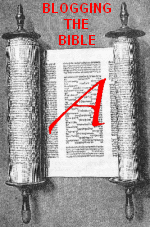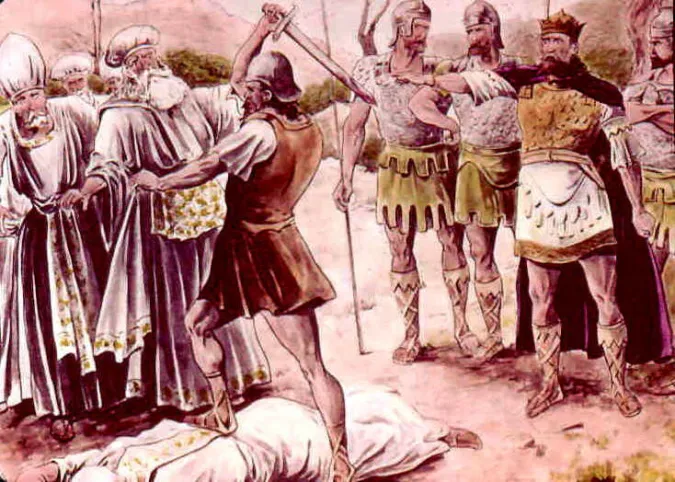 The next few chapters contain some of the most advanced story-telling in the Bible, something worthy of authors paying attention. And I do mean story-telling. From my Completely UnbiasedTM reading, the odds of these having any kind of historical basis (even if David did exist) are slim to none.
The next few chapters contain some of the most advanced story-telling in the Bible, something worthy of authors paying attention. And I do mean story-telling. From my Completely UnbiasedTM reading, the odds of these having any kind of historical basis (even if David did exist) are slim to none.
The story from now until the end of 1 Samuel places it squarely in the crime fiction genre. We now see David’s first moments as a “traitor” of sorts. In fleeing from Saul, he gets shelter/comfort amongst the non-Jewish nations surrounding Israel. In chapter 22 he briefly stays with a Moabite king until an Israelite prophet tells him to cease and desist. Of course today it probably reads just as him trying to survive, (kind of like a crime movie where a character joins an opposing family for protection). But given how much hatred of the “other nations” the Bible has, I’m surprised. Although the book of Samuel has been pretty tame in terms of xenophobia so far and from what I remember it stays this way.
The next Sopranos moment comes as a result of the last post where David encounters a priest and gets consecrated bread by saying he’s on an official mission from Saul. At the time, Saul’s chief herdsman (Doeg the Edomite) is present. Doeg spills the beans to Saul that he saw David fleeing under the false pretenses of a mission.
Like any good Don, Saul orders a hit on the Ahimelech (the priest in question), his “father’s house”, the priests who were with him (85 people) and the entire priestly city of Nob where David came to. So there’s even the “I’ll wipe out your whole family” bit of mafia drama here — although this is commonplace in the Bible. The honour of killing Ahimelech and company falls on Doeg.

David then has two selfish moments. Firstly, he hears the news about the slaying from one of Ahimelech’s sons who managed to escape. He says: “I knew on that day, when Doeg the Edomite was there, that he would surely tell Saul; I have brought about the death of all the persons of thy father’s house. Abide thou with me, fear not; for he that seeketh my life seeketh thy life; for with me thou shalt be in safeguard. (22:22-3)” It’s nice how he’s all repentant and shit now! (Although I guess it actually might explain why in future he spends more time amongst other nations, away from people Saul can easily get to.)
The second moment is when he finds shelter in the Israelite town of Keila. Saul finds out and David finds out that Saul finds out. Now one of the priests gave him The ephod, a vest used for divination by the High Priest (I say The because there was only one in all of Israel). David uses it to ask YHWH* whether Saul will come to besiege Keila and whether the citizens will deliver him into Saul’s hands. The answer to both is yes so he flees. But note that it seems David’s no longer concerned with actual citizens (unlike the previous incident). The presumption behind the questions is that if the Keilites would not have delivered David he’d have stayed putting all the citizens in danger of a siege — and given the times, a massacre.
These two incidents set David off on a sociopathic streak that lasts for much of his reign.
*Remember him? YHWH’s quite absent for a lot of the book. I think that’s what makes the narrative quite good: rather than relying on divine intervention, the authors need to spend more time on tales where everything happens naturalistically.





0 Comments